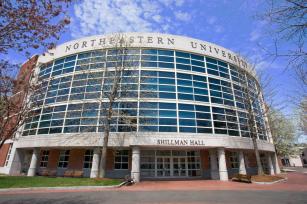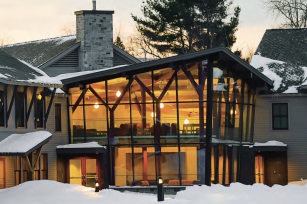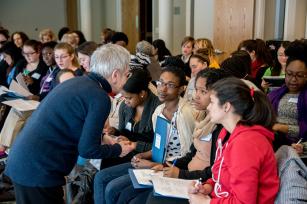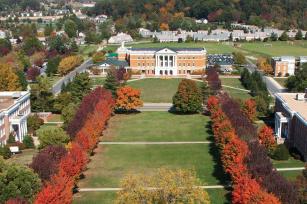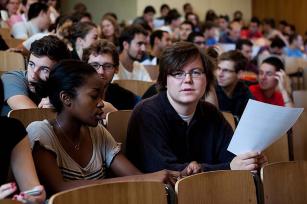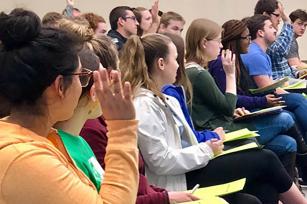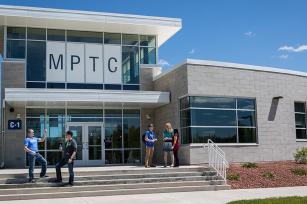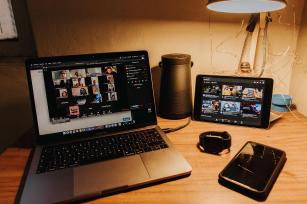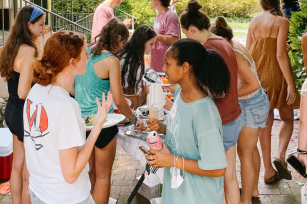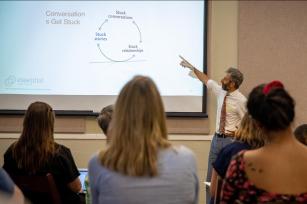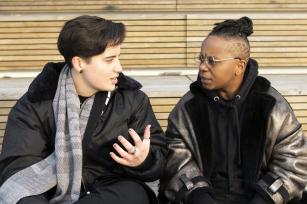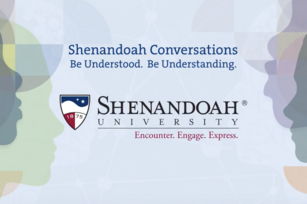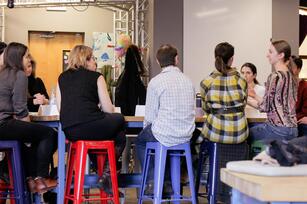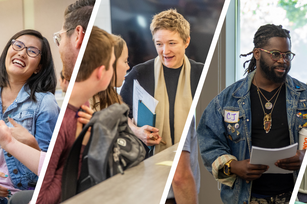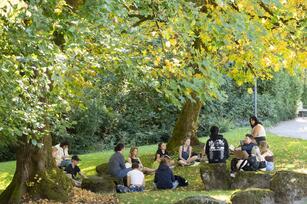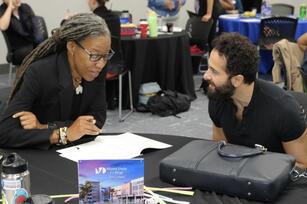
Breadcrumb
- Essential Partners
- Our Impact
- Impact Stories
- UConn Goes All In with Dialogue
UConn Goes All In with Dialogue
The seeds for the University of Connecticut’s commitment to dialogue were planted nearly a decade ago. In 2016, the university held “A Dialogue on Dialogues,” which reflected a collective desire to understand and incorporate dialogue at UConn. Essential Partners (EP) was one of the external organizations invited to join.
Since that time, UConn and EP have enjoyed a strong reciprocal relationship. After two UConn faculty members won a multi-million dollar humanities grant from the John Templeton Foundation to explore Humility and Conviction in Public Life, EP became a subawardee. The goal of EP’s project was to allow EP to adapt its Reflective Structured Dialogue (RSD) approach for higher education classrooms—and bring those learnings back to UConn.
The ultimate result of that initial commitment was UConn’s “Democracy and Dialogues Initiative (DDI),” part of the university’s Gladstein Family Human Rights Institute (HRI). DDI infuses the university’s work with EP tools on campus, in the community, and, importantly, in the classroom.
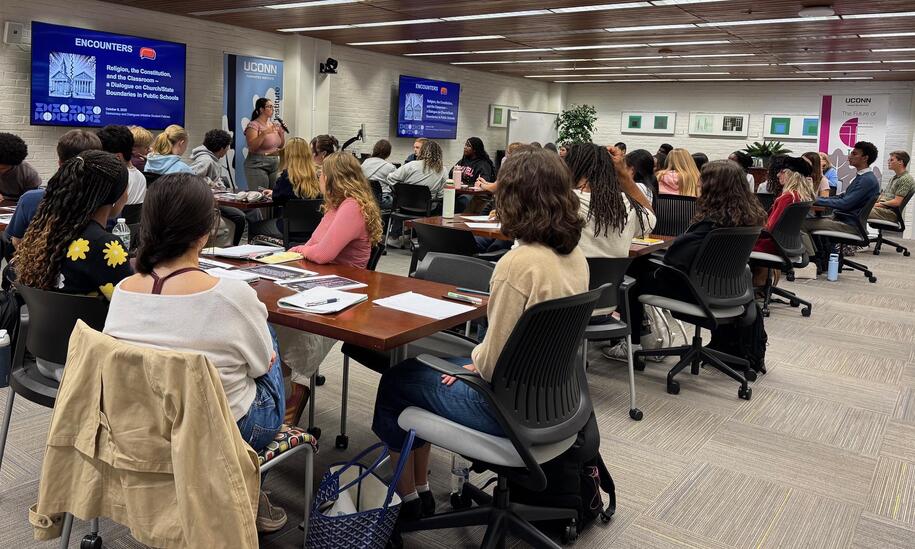
“Students come to university so they can think deeply about issues that matter. They are the future, and the stakes are high. They want spaces where they can think these things through.”
Noga Shemer, Associate Professor in Residence
Department of Anthropology
Democracy and Dialogues: RSD Training for All
DDI is co-directed by Brendan Kane, Professor of History and Professor of Literatures, Cultures, and Languages, and Nana Amos, who serves as director of Community Outreach and Engagement for Dodd Human Rights Impact Programs of HRI. DDI’s co-leadership model helps bridge between dialogue in co-curricular campus activities and in the community and dialogue in the classroom.
DDI has a strong service component, running dialogues not just on the university campus but also in the surrounding community. But DDI goes one crucial step further: It trains others to run their own dialogues as well. Effective facilitation is essential to the successful use of RSD, and the Initiative provides trained facilitators for dialogues on and off campus. Training more people in how to facilitate RSD means that the university and the community have more capacity to hold difficult, necessary conversations.
DDI trains stakeholders in several different methods, including their own Encounters model, but have a particular respect for the flexibility and impact of RSD. To date, DDI has trained more than 1,000 individuals in RSD—faculty, staff, students, members of the public, and even students at E. O. Smith High School (where UConn students train “near peers” at the high school).
On campus, RSD has been included in faculty workshops on dialogue in the classroom and in partnerships with the Center for Excellence in Teaching and Learning (CETL), used to support residence hall advisors and on-campus faith communities, and incorporated into student trainings in a variety of disciplines. Off campus, DDI trainings are often open to local community members, helping to foster a broader culture of dialogue, intellectual humility, and open discourse.
Dialogue in Co-Curricular Events
Members of the university community have also participated in a variety of DDI-hosted, issue-focused dialogues, open to anyone on campus. Many of these dialogues are developed, organized, and facilitated by DDI’s Student Fellows, who are compensated financially or with academic credit. Topics addressed include mental health, voting, censorship in education, and checks and balances in the government.
In the 2024-2025 academic year alone, 57 dialogic programs were held in collaboration with a broad array of partners. Eleven undergraduate students were also mentored and trained to plan and execute peer dialogues.
Ancy Trinita Leo, a 2025 graduate of the Allied Health Sciences undergraduate program, reflects on her two-year experience as a Student Fellow. Noting recent issues that have come up nationally and internationally, she says, “The Student Fellows noticed there wasn’t a space for students to come together to talk about this in a structured format. There have been some protests on campus and some other endeavors, but there hasn’t been a space where people can come together and discuss these topics without it being a debate or without it being there’s a right or wrong. So the Student Fellows all work together to formulate a way that we can talk about these topics that would be beneficial for our UConn community as well as our outside community in Connecticut.”
“My mind was blown at the level of vulnerability at my table. It was such a beautiful experience for me. After that particular dialogue, I became a believer.”
Saah Agyemang-Badu, MA Candidate
Silver School of Social Work
Dialogue Encounters in the Community
In the surrounding community and throughout Connecticut, DDI offers a range of “Encounters,” a model for structured conversation that blends dialogue with content expertise. Community partners include the Hartford Public Library, Connecticut’s Old State House and the Connecticut Democracy Center, the Wadsworth Atheneum, the Amistad Center for Art and Culture, the Akomawt Educational Initiative, and HartBeat Ensemble.
According to Kane, “We say to our partners, ‘What do you have going? And what would you like a dialogue about?’ And then we put the dialogue together in collaboration with them. We take the lead, and we provide the people to come do them: moderators and facilitators.”
DDI’s graduate assistant Saah Agyemang-Badu, a student in the Master’s in Social Work program, facilitates RSD-based dialogues throughout the community. “It was a steep learning curve for me,” she says as she remembers the first time she helped plan and facilitate Encounters—a community dialogue on a sensitive topic. DDI was working with a community partner to host a dialogue on intimate partner violence, and Agyemang-Badu, who had just begun working with DDI, was worried that RSD wouldn’t work for such a fraught issue.
She knew in theory that RSD would allow them to put the issue in a “container” and that people would be able to “freely discuss their experiences if they are feeling safe.” But she recalls, “I didn’t understand how that was going to work or how that was going to look. I felt it was too sensitive for a conversation like that to happen.”
At the pre-dialogue planning session, Agyemang-Badu thought, “This is too touchy. I don’t think people will open up to have this conversation.”
“I was a skeptic,” she says. The dialogues she had participated in up to this time had been on democracy, a topic she felt was “not that sensitive.” At the dialogue, which had 25 to 30 attendees, she facilitated one of the tables. The participants at her table—from UConn students to a senior community member—shared their experiences authentically and deeply.
“My mind was blown at the level of vulnerability at my table,” she recalls. “It was such a beautiful experience for me. After that particular dialogue, I became a believer.”
Dialogue in the Classroom
Like Agyemang-Badu, Noga Shemer recalls her first use of RSD. “When I started bringing the RSD model into the classroom, it changed everything, and I had this overwhelming sense of what the classroom could be,” she says. “The student feedback was unlike anything I had seen before. Students said, ‘Wow, why haven’t we had the chance to do this before? And why don’t we get to do this more often in our education?’”
An Associate Professor in Residence in the Department of Anthropology and a faculty affiliate in DDI and CETL, Shemer says that RSD helps her not only facilitate challenging conversations: It also helps her “create an inclusive classroom beyond anything I have been able to do before because everyone is participating and everyone is being heard.” This “radical shift in the classroom dynamics,” she says, makes it possible for “students to talk about things in an open way and share their experiences and viewpoints without some of the typical conversation patterns erupting.”
“I realized,” Shemer concludes, “that this was something I should be doing in all my courses proactively, way before we got to the class that was about the hard subject.” She finds that RSD works “even in a really large lecture hall,” making it feasible for an introductory-level general education course.
“When I started bringing the RSD model into the classroom, it changed everything, and I had this overwhelming sense of what the classroom could be. The student feedback was unlike anything I had seen before. Students said, ‘Wow, why haven’t we had the chance to do this before? And why don’t we get to do this more often in our education?’”
Noga Shemer, Associate Professor in Residence
Department of Anthropology
Dialogue as a Graduation Competency
In 2020, toward the end of the first Donald Trump administration and the election of Joe Biden, UConn’s president convened a university committee to look at civil discourse and dialogue, chaired by Professor Kane.
The committee’s most important recommendation was to add dialogue as a graduation competency. Its members felt, says Kane, that dialogue should be critical at a “taxpayer-funded, land-grant institution that has written for itself a charge to prepare people for local, national, and global citizenship and to serve as an ongoing model for that kind of movement throughout the world.”
With UConn’s growing interest in and commitment to dialogue, DDI and CETL began offering faculty trainings and workshops informed by EP tools and sometimes facilitated by EP staff and consultants. This helped faculty gain a better understanding of RSD, how it can be used and incorporated, and how it differs from other forms of dialogue and from communication as a field.
While all of this was happening, UConn was in the process of updating its general education program. The new Common Curriculum, which launched in August 2025, includes a dialogue graduation competency. All undergraduate students will have experience with dialogue as part of their graduation requirements through the Common Curriculum.
UConn is the first public R1 institution to create a dialogue graduation competency. Approving this change was a major accomplishment and required both extensive and intensive work across the huge institution. “Hundreds of people worked to make it happen,” says Pamela Bedore, Professor of English and chair of the Common Curriculum Committee (CCC) from 2022 to 2025.
Implementing the change will require even more work, but Bedore says, “There’s a really big level of energy for the new curriculum.” Junior faculty are especially excited about the focus on dialogue, and they are “going to do wonderful, new, innovative things in the classroom,” says Shemer.
UConn is committed to integrating dialogue into every Common Curriculum course. Jamie Kleinman, Associate Professor in Residence in the Department of Psychological Science, is the incoming chair of the Common Curriculum Committee. She says, “I want every STEM class to have a dialogue. Imagine if the students had more practice doing this in more of their classes. It really speaks to the nature of approaching this from a systems perspective and how big a need there is for that.”
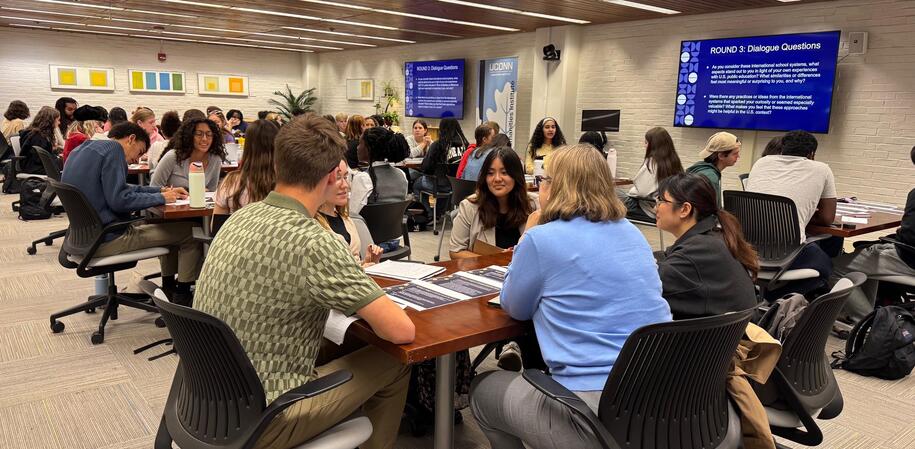
“I want every STEM class to have a dialogue. Imagine if the students had more practice doing this in more of their classes. It really speaks to the nature of approaching this from a systems perspective and how big a need there is for that.”
Jamie Kleinman, Associate Professor & Chair of the Common Curriculum Committee
Department of Psychological Science
At UConn, the Future Is Now
From DDI and CETL to the Common Curriculum Committee, Reflective Structured Dialogue is having an impact on students, faculty, staff, and community members.
Of special importance are junior faculty, who represent the future of the university. Anna-Michelle McSorley, an assistant professor in the Department of Allied Health Sciences, joined UConn in 2024. As a professor specializing in health equity, she works with a variety of students, some of whom will go into public health, others who will directly provide medical services. She sees a strong link between dialogue, democracy, and health.
“Healthy democracy, healthy people,” McSorley says. “The huge space where we engage in the practice of what it means to be a citizen, what it means to be civically engaged, what it means to have dialogues through difference—that is the role higher ed is meant to play. We need the community to see us as the place that they can come to practice and learn that.”
Also key to the future is the university’s students. What can they learn from RSD, and what can they take into their lives post-college to work for a better world?
“Many of our students crave this kind of education, and they don’t even realize that they’re craving it,” Shemer reflects. “But when it happens, it is a life-changing experience. I look at my classroom, where we talk about every politically sensitive topic there is, and the students are learning from each other. They are changing their own minds, each other’s minds. They are in it together. They crave mediated, facilitated spaces that are not social media.”
“Students come to university so they can think deeply about issues that matter,” Shemer concludes. “They are the future, and the stakes are high. They want spaces where they can think these things through.”
Related Impact Stories
Testimonials

Jamie Kleinman, Associate Professor“I want every STEM class to have a dialogue. Imagine if the students had more practice doing this in more of their classes. It really speaks to the nature of approaching this from a systems perspective and how big a need there is for that.”
Department of Psychological Science, University of Connecticut

Janet Bixby, Director of Community Dialogues“Essential Partners has the magic sauce—its trainings. Working with Essential Partners and Community Dialogues has enabled us to say, ‘Hey, we have tools to help us be able to do this, and we have ways to do this. We can address these things.’ That's been incredibly useful and powerful.”
Lewis & Clark

Undergraduate StudentI feel more comfortable participating in class and less defensive when other students disagree. And because I learned more from my fellow students about their views, I now feel less competitive with them than in other classes.
Bridgewater College, Virginia

Ben Meoz, VP for Student Life and Dean of Students“We want to cultivate genuine curiosity among students so that they really open themselves to the needs of others and also feel like others have an awareness of what their needs and experiences are.”
Lewis & Clark

Jonathan Noyalas, Director of the McCormick Civil War Institute“RSD has been the most transformative thing in my 21 years of teaching. … Students have a greater desire to open up in class about things because they know that a Noyalas class is a safe environment. ‘I can say things here. I’m not going to be judged. I understand I’m contributing to a broader conversation.’”
Shenandoah University

Katie Shear, Civic Engagement CoordinatorUsing what we learned from Essential Partners, staff were able to model effective and respectful communication for students. A next step would be for us to help students employ some of these methods themselves. The staff not only gained skills in communication but also left feeling supported by each other in the work that we do.
Southern Vermont College, VT
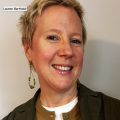
Lauren Barthold, Philosophy FacultyI’ve learned that it is not enough to announce my commitment to dialogue and expect students to know what I mean; I need concrete exercises to allow students to learn how to do it.
Endicott College, Massachusetts

Undergraduate StudentThe most significant thing for me was learning how to ask for more information rather than trying to persuade a person to think differently. I also learned helpful dialogue tips, which are more effective during difficult conversations. If I encounter a difficult dialogue with any of my residents, I plan on using the techniques I learned in this workshop to facilitate those talks.
Northeastern University, MA

Undergraduate StudentEvery opinion was accepted. No one felt judged or uncomfortable talking to one another. These have been, by far, the best classroom discussions I have ever had.
Bridgewater College, Virginia

James Rucker, Faculty MemberIt is really different than it was before. The Essential Partners process has given me the power to be heard and be seen. It’s unreal.
Randolph College (VA)

Karen Ramirez, Director of the CU Engage ProgramWe get more requests [for campus dialogue] than we could ever respond to.… I’m proud that our work on campus is actually kind of unusual, because it doesn’t support just one population. It supports everyone—students, staff, faculty, graduate students. I don’t know if there are other University of Colorado projects going on that hit all of our campus population.
University of Colorado, Boulder

Etionette Nshirmirimana, Burundian Master TrainerI realized that by using the “dialogue” approach, people could talk of what is deep in their heart, especially things that have harmed them.
Burundi

Anne Hopkins Gross, Dean of StudentsThe Essential Partners workshop was a way of building up our ability to talk about more difficult issues, such as poverty and GLBTQ safe spaces. It was really the foundational entrée into those more challenging issues of race, ethnicity, sexuality, and gender. People walked away feeling much more confident about having difficult conversations.
Southern Vermont College, VT

Dr. Brooke Vuckovic, Clinical Professor of Leadership“The Dialogic Classroom is by far and away the most skillful and thoughtful professional development I have had in years as an educator.”
Kellogg School of Management

Undergraduate StudentDialogue challenged us to think more deeply about the class topics. Talking about our own thoughts and experiences in relation to the topic also challenged us to think about our own views and articulate them more clearly.
Gordon College, Massachusetts

Megan DeFranzaHere safe space was created for pastors and church leaders to wrestle with topics like evolution which are all too often “off limits” or believed to be antagonistic to the faith.
Gordon College, Massachusetts

Anjali Bal, Associate Professor of MarketingOne of the things that we talked about was the ability to hear another person’s point of view, even if our minds aren’t changed. We have to remember that any sort of movement is movement. If we don’t acknowledge small movement, then we just stay on two different sides, and it’s all black and white, and we don’t hear each other.
Babson College, MA

Undergraduate StudentI have learned how to not be offended and to be better prepared to receive other people's communication. You don't have to agree, but you can respect the other person.
Randolph College (VA)

Amy Cottrill, Birmingham-Southern CollegeThe past few years in our country have been the most divisive and alienating in my lifetime, which can be a tremendous challenge in the classroom that aims for community, shared experience, and listening with empathy to opinions that are different from one's own. The Essential Partners workshop I attended provided invaluable tools to meet the challenges of teaching today. It helped me reimagine the classroom as a place to help students learn the essential tools of living and learning in community and interconnection, skills that are necessary in every single area of life. I have no doubt that my teaching has been dramatically reshaped in light of my introduction to structured dialogue and I feel like I have so much more to offer my students because of that.
Birmingham, AL

Undergraduate StudentI learned to expect the best of my classmates, even when we don’t agree. I can’t write off their opinions anymore, despite our disagreements.
Bridgewater College, Virginia

Undergraduate StudentAt the beginning of the semester, there was not much participation in class. But by the end, almost everyone had something constructive to add every day.
Bridgewater College, Virginia

Undergraduate StudentAs a pharmacy major, I do not receive much training on how to handle difficult or controversial conversations. I think that this training will help me not only in my duties as a resident assistant, but in discussing medications and therapies with future patients when the conversation becomes difficult.
Northeastern University, MA

Noga Shemer, Associate Professor in Anthropology“When I started bringing the RSD model into the classroom, it changed everything, and I had this overwhelming sense of what the classroom could be. The student feedback was unlike anything I had seen before. Students said, ‘Wow, why haven’t we had the chance to do this before? And why don’t we get to do this more often in our education?’”
University of Connecticut

Beth MendozaDialogue gets more results. It makes decision-making easier. It makes creating participation easier … our greatest organizational impact has been more contributions as well as more effective and efficient meetings.
Moraine Park Technical College, Wisconsin

Patrick Hale, director of Multicultural and Identity ProgramsOne of the things that’s so crucial to even fostering dialogue around diversity, equity, and inclusion is creating opportunities for folks to engage in deep reflective self-awareness.
Babson College, MA

Bob Bordone, Expert and AuthorEssential Partners does the best work in the field of dialogue and communication.
Harvard Negotiation & Mediation Clinical Program, Co-Founder

Undergraduate StudentThe professor was able to engage every student. She encouraged them to present new ideas. Dialogue helped create an environment that really deepened the understanding of the material.
Southern Methodist University, Texas

Cricket Fuller, The Christian Science MonitorThis wasn’t a policy debate [about guns]. Instead, two people whose backgrounds and views diverged in almost every way possible shared a moment of honesty that struck at the heart of the matter.
Boston, Massachusetts

Undergraduate StudentDuring one dialogue, as we were reading The Joy Luck Club, we were asked to discuss our relationship to America. There were students who grew up in the United States and also those who hadn’t—and I was surprised to hear that everyone had equally complex relationships with the topic.
I appreciated being able to hear and express the full depth of our own context before delving into a discussion about first-generation immigrants.
Gordon College, Massachusetts
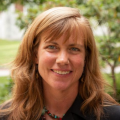
Dr. Jill DeTemple, Religious Studies FacultyAfter using this approach in my classroom, I am now more willing, and more able, to engage students in meaningful conversations about potentially contentious issues. Whereas I used to nod toward things like homosexuality in religious life, interfaith marriage, or the role of government in reproduction, now I build these conversations into the class so students can learn to speak about their experiences, and so they learn to listen and learn from those with whom they might disagree.
Southern Methodist University, Texas

Program ParticipantI felt an amazing sense of accomplishment when the Essential Partners training ended; that I'd done something important for my community and something important for me.
Massachusetts

Undergraduate StudentI learned a lot about myself from others’ perspectives—it was comforting to hear similar values and ideas expressed, yet really eye-opening and intriguing to hear very different philosophies.
Dartmouth College, New Hampshire

Teresa Grettano, Associate Professor and Director of the First-Year Writing programFacilitated dialogue creates a classroom atmosphere in which exploring uncomfortable issues and asking difficult questions is an expected part of the process, and it allows students space to engage each other without fear of the vitriol common in our public discourse.
University of Scranton (PA)

Lucinda Garcia, Researcher, Educator & AdvocateThe Dialogic Pedagogy Fellowship at Tufts University, in collaboration with Essential Partners, gave me transformative social-emotional learning and facilitation skills to support meaningful dialogue in the classroom. I’m excited to apply what I’ve learned to design questions that invite personal narratives, value-based discussion, and comfort with complexity—all in service of building a classroom climate where productive dialogue and engaged learning can flourish.

Undergraduate StudentIt’s nice to talk about things that we encounter all the time but rarely get talked about. This made me hopeful that there are people who are willing to talk about serious issues.
Dartmouth College, New Hampshire

Kim Davidson, OmbudsI’ve gained not only confidence but tools. The Essential Partners training was worth every penny.
Oberlin College, Ohio

Alex Lyford, Assistant Professor of StatisticsI can't possibly overstate the positive effects the Dialogic Classroom training had on the curriculum and approach to my Introduction to Data Science class. The difference in the course from a year ago and now is night and day. My lectures are now filled with meaningful discussion and discourse—often related to sensitive topics that I wouldn't have dared touching without the training. Student feedback about these discussions has been overwhelmingly positive, and there is no chance that I would have had the wherewithal or initiative to revamp the course in such a dramatic manner without the training.
Middlebury College

Elizabeth Zehl, Undergraduate StudentEssential Partners' process gives people the space to be intellectually curious and to engage with others on important issues in a way that also benefits their own understanding of what they believe.
Randolph College (VA)

Undergraduate StudentI started to trust everyone in the class—I felt heard and I felt that people wanted to listen. As a result, I wasn’t afraid to let my past come out and let people learn from what I have been through.
Bridgewater College, Virginia

Anjali Bal, Associate Professor of MarketingWe talked about where we are in the world right now, so we talked quite a bit about polarization. Essential Partners showed how these conversations are becoming more taxing and challenging because of that polarization. These were some first steps in terms of how we can start to have those conversations.
Babson College, MA

Nicki Glasser, Policy CoordinatorWhat surprised me was how much you could transform a relationship during a three-hour conversation.
Transformation Center, Massachusetts

Noga Shemer, Associate Professor in Anthropology“Students come to university so they can think deeply about issues that matter. They are the future, and the stakes are high. They want spaces where they can think these things through.”
University of Connecticut

Janet Lansberry, Weissman Center Assistant DirectorThis was probably the most profound workshop that we ever brought to campus. It offered a really unique foundation in personal insight.
Mount Holyoke College, MA

Program ParticipantI did not anticipate having as many concrete takeaways as I do. I feel there is an immense practical application.

Program ParticipantThis is the best adult learning experience I have had in the past five years. I wanted to learn new skills—I did!

Undergraduate StudentI notice that my classmates take much more care when speaking about people who practice other religions. They make fewer assumptions, and they’re more careful with their words to make sure to avoid unintentional connotations.
Bridgewater College, Virginia

Megan DeFranzaThere is a need not only for safe space within our churches but for our church leaders who often feel alone, or who may feel their job could be at risk if they engage in controversial conversations. How are they to make safe spaces in their own congregations for healthy dialogue if they rarely experience safe space to do the same?
Gordon College, Massachusetts

Undergraduate StudentWe tackled really difficult topics and this helped everyone know each other and understand each person's individual perspective. Over the course of the semester, I became much more comfortable engaging with my classmates—specifically because of the peer dialogue groups.
Bridgewater College, Virginia
